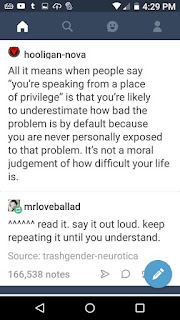Privilege: a special right, advantage, or immunity granted or available only to a particular person or group of people.
Now, this is the standard definition of privilege that most folks agree upon. It is the standard to which we adhere to in normal conversation. When someone says, "You have privilege," we immediately think, "I have an advantage over someone else."
But according to those who like to redefine things, privilege has a different connotation.
So, privilege is not a special right or advantage, but is instead the idea that you do not have a particular life experience and cannot understand what another is going through. And, of course, you will "likely" underestimate just how bad the problem really is because, since you haven't gone through it, you really, really just don't get it.
If this is the case, then "privilege" ideology is simply a reiteration of placing one's experience as the highest form of knowledge possible. Same song. Another, tiring verse.
There are two problems with this approach that I can see.
First, every, single, bloody person has different problems. No one shares every single experience alike. Therefore, it logically follows, given the proposed definition, that EVERYONE has privilege. How? Well, given my particular situation: if you are not a white, male, heterosexual, rural, Lutheran, pastor who is married to a vertically-challenged, Italian, heterosexual female Spanish teacher who, together have two adopted, bi-racial daughters, and then a naturally born son--with all the trials and problems that such dynamics create, then when you address me about things I am going through, then you are a person of privilege. You can't possibly know share this experience with me. You can't possibly share the problems that I have. You don't have that experience. You have privilege!!!
Taken to its logical conclusions, the definition is quite meaningless!
But that perhaps is not the worst of the problem. For by essentially limiting authority to personal experience, it is also quite possible that one exaggerates ones problems beyond the scope of reality. Saying that should get me in a bit of trouble, but frankly, I don't care. It's simply the truth. (Caveat: there are obviously some problems that are tremendous. When you are diagnosed with terminal brain cancer, that is a gigantic problem.) For instance, as the father of a "tween" daughter, at least once a week, I hear the dreaded words, "You just don't get it!"
Well, in a way, my daughter is right. I don't fully get the "tween" angst problems of today. There weren't cell phones and the technology of today during my time. Athletics wasn't quite the booming business that it is today. Her school is a bigger school than I went to. And, of course, she is a she. I am a he. And she is bi-racial and I am white. I don't get it--on one level.
But taking a step back and looking at a bigger picture, I darn sure do get it. I darn sure can see what is going on, and I can tell my daughter with conviction that these problems that she is experiencing are minor. They aren't life-threatening. They are not a threat to her person and being. There is a much larger world that she will experience, and the trials and tribulations she is experiencing now will seem like minuscule things in the future. Learning to cope with these small things will give her confidence to deal with the bigger things later. Learning to put things in proper perspective now will help her put things in proper perspective later. Learning to look at the big picture now will help her get away from myopia in the future. Although she might think that her world is crashing down around her and that all hope is lost, it is my job to remind her that there is a very big world out there and that what is happening to her right now will only have as much bearing on her future as she allows. Allowing her to dwell in her limited experience will only harm her.
Allowing anyone to dwell in his or her limited experience will only harm him or her. For experience is not the be all and end all of knowledge. There is a vast array of knowledge that does not come from experience, and oftentimes that knowledge is much more reliable than our limited experience.
If you want to talk about privilege, then let's do so under the standard definition. We can easily talk about how some folks have advantages that others do not. We can easily talk about ways to improve the lot for those who indeed are disadvantaged. But let's not go changing definitions to suit our own purposes. You don't have that privilege.

No comments:
Post a Comment